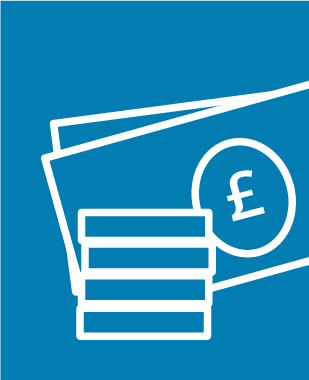Being in debt can be stressful, especially if you don’t have a clear plan of how to manage and repay it. If you have multiple debts, whether that’s a mortgage, credit card or loan, for example, it’s important to tackle the situation as soon as possible.
Debt doesn’t go away on its own and, the longer your debt is left unchecked, the more serious it could become.
If you’re struggling financially and you’re not sure if you can cope on your own, it may be worth contacting a debt charity for advice on your situation.
Alternatively, below are five steps that can help you to manage and gain control of your debts.
1. Calculate how much you owe
To start, calculate how much debt you have. This means looking at any overdrafts, loans, buy now pay later products and credit cards; essentially everything that is charging you a rate of interest.
It’s also worth prioritising your debts. Priority debts, such as mortgages, secured loans and energy bill arrears can have more serious consequences if you fall behind on repayments, so you should always address these first.
Non-priority debts include credit cards, overdrafts and personal loans. However, while they are called “non-priority debts”, you should always aim to repay them in full and on-time wherever possible.
Although it can be difficult to confront the extent of your debt, it’s important to do this so you can understand the scale of the problem and figure out your next steps.
If you’re finding it hard to repay your debts, it’s worth speaking to your creditors to explain the situation. Creditors should treat you fairly and consider alternative arrangements, so you may be able to work out a new payment plan that’s more affordable for you.
2. Work out a budget
Now you know how much you owe, it’s time to get a clear picture of your overall financial situation.
First, work out your monthly income, including your salary, any benefits you may receive and any income from self-employed activities or side hustles, for example.
Next, calculate how much you are spending on essential costs, such as rent or mortgage payments, bills (energy, water, council tax, internet), travel (car maintenance, fuel, public transport), and food.
Finally, you should review your non-essential costs. This could include spending on gym or streaming subscriptions, socialising and holidays, for example.
You can then work out if there are any opportunities to cut back on your spending, whether that’s cancelling a subscription, eating out less or switching to a cheaper broadband deal, for example.
All this information will allow you to see how your income compares to your expenditure and how much money you can afford to put towards clearing your debt.
If you find that your income doesn’t cover your essential living costs and your debt repayments, you should ask for professional help as soon as possible. There are debt charities and organisations that can offer free advice and practical support for your individual situation.
If your income is sufficient to cover your spending and you feel confident that you can manage your repayments, there are several strategies that could help you effectively pay off your debt.
3. Remove the temptation to get into more debt
As you work to pay off your debt, it’s important not to increase it further by applying for more credit.
It may be worth closing any credit cards or store cards you’re not using to minimise the temptation of unnecessary spending. Alternatively, you could consider asking your provider to reduce your credit limit.
If you have an overdraft, you could ask your provider to reduce the limit on this or, if you’re not using it, to remove it completely.
4. Choose a debt repayment strategy
If you can afford your debt repayments but you want to clear your debt faster and more efficiently, there are several strategies you could consider.
Whatever strategy you choose, you could consider setting up a direct debit or standing order on your account. This way you’ll never have to remind yourself to make your monthly repayments.
And, crucially, you should always make sure you pay at least the minimum payments on all of your debts.
Debt snowball method
This is where you completely pay off your smallest debt first, before working your way up to your largest debt.
For example, if you owe £300 on an overdraft and £800 and £1,500 on two credit cards, using the debt snowball method you would focus on paying off the overdraft first, while making the minimum payments on your credit cards. Once you’ve paid off your overdraft, you would then focus on paying off the £800 balance and so on.
The idea behind this approach is that the accomplishment you’ll feel by paying off a debt will keep you motivated and help you stick to your repayment plan.
However, this method isn’t always the most cost-effective approach as it doesn’t consider the interest on your debts. This means you could end up paying more interest overall than if you focused on paying off your most expensive debts first, instead of those with the smallest balances.
Debt avalanche method
In contrast to the snowball method, the debt avalanche method is when you focus on paying off your most expensive debt first and work your way down to the least expensive debt.
While this can work out to be cheaper than the snowball method – as you’ll be paying less interest in the long run – it can take a lot of self-control, as you may not see results right away. It could take a long time to pay off your most expensive debt, which means you won’t necessarily feel the same sense of achievement as if you cleared one or more smaller debts in the same time period.
Debt consolidation
If you have several debts, you could consider moving them all under one interest rate, perhaps through a personal loan or, for your credit card debts, a balance transfer card.
This means you only pay off one lender and, depending on the interest rate of the loan or credit card you use to consolidate your debt, you could pay less in interest overall. However, you should always think carefully before applying for more credit to consolidate your existing debts and consider all the risks it could involve. You can find more information on the pros and cons of this debt repayment method in our debt consolidation guide.
5. See if you can earn more money
If you have time, you could see if there’s a way for you to earn more money. Whether you take on a second job, turn a hobby into a side hustle, rent out a spare room or sell any unwanted clothes or items in your house, this extra money could help you pay off your debts faster.
Make sure you consider any tax implications any extra income could have.
It’s also worth checking that you’re claiming all the benefits and extra financial support from the Government or your local council that you’re entitled to.
Who can I speak to about my debt?
If you’re worried about your debt, remember that you’re not alone, and there are thousands of people in the same position as you.
If you are feeling overwhelmed, you should reach out for help. Below are some organisations which can provide specialist advice free of charge to help you get out of debt.




